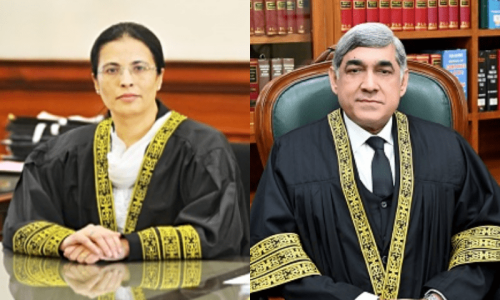• Revised cause list excludes Justices Ayesha Malik, Aqeel Abbasi, strength of bench reduced to 11 members
• Both judges question ECP’s legal grounds for seeking review
• Counsel argues July 12 verdict granted relief to a ‘non-party’
• Constitutional Bench issues notices to respondents, seeks commission’s reply to PTI’s contempt petition
ISLAMABAD: In a move that left at least two judges visibly bewildered, the 13-judge Constitutional Bench (CB) of the Supreme Court on Tuesday issued notices to the respondents on petitions seeking to revisit the July 12, 2024, verdict that allocated reserved seats to the PTI.
However, Justice Ayesha A. Malik and Justice Aqeel Ahmed Abbasi insisted that the presiding judge, Justice Aminuddin Khan, formally record their opposition to issuance of notices to the respondents, as they had dismissed the review petitions outright — which had been filed by the PML-N, PPP and the Election Commission of Pakistan (ECP),
The two judges indicated that they would later provide separate reasoning for their stance.
Although the hearing was adjourned until Wednesday, a revised cause list issued later in the day showed that Justice Ayesha and Justice Aqeel would no longer be part of the larger bench.
Consequently, the strength of the Constitutional Bench would be reduced from 13 to 11 members: Justices Aminuddin Khan, Jamal Khan Mandokhail, Muhammad Ali Mazhar, Syed Hasan Azhar Rizvi, Musarrat Hilali, Naeem Akhter Afghan, Shahid Bilal Hassan, Muhammad Hashim Khan Kakar, Salahuddin Panhwar, Aamer Farooq and Ali Baqar Najafi.
“Since they have dismissed the reviews, there is no occasion for them to remain on the bench now,” observed a senior counsel on condition of anonymity. “They have given a final judgement, so they cannot sit on the bench.”
The bench also issued notices to Attorney General (AGP) Mansoor Usman Awan under Section 27A of the CPC and ordered the ECP to furnish a reply by Wednesday on the contempt of court petition instituted by PTI leader Kanwal Shauzab for not implementing the July 12 judgement. Interestingly, the contempt of court case has been delisted and will not be heard on Wednesday.
After consulting the other judges, Justice Aminuddin began dictating the order amid heated arguments, which took the two judges by surprise.
In its July 12 short order, the Supreme Court, by a majority of eight to five, held that the 41 returned candidates out of a total of 80 MNAs were and are the returned candidates of the PTI and, therefore, members of the PTI’s Parliamentary Party in the National Assembly for all constitutional and legal purposes.
When senior counsel Sikandar Basheer Mohmand appeared on behalf of the ECP, Justice Ayesha questioned how the commission was aggrieved by the July 12 judgement and whether the review petition was maintainable without implementing the court’s earlier verdict. Justice Aqeel also inquired how the ECP was a party to the matter.
In response, the counsel pointed out that the initial hearing before the Supreme Court was not initiated as a public interest case but as an appeal against the order of the Peshawar High Court, as a result of which the commission was made a necessary party in the case, adding that the ECP had not approached the court on its own.
But Justice Ayesha questioned how the ECP could appear before the court without first implementing the majority decision of the Supreme Court, especially when the court had already interpreted the commission’s decision regarding PTI in its judgement.
Justice Hashim Kakar also wondered that when the July 12 judgment — whether delivered rightly or wrongly — had not been implemented, what guarantee was there that the decision of the present bench would be implemented.
The counsel, however, tried to explain that the judgement had been partially implemented, adding that the commission had also submitted additional grounds along with its review petition.
Justice Ayesha, however, questioned how the commission could decide which parts of the judgement to implement and which to disregard.
The counsel responded that the SC, through its July 12 judgement, had granted relief to a party that was not even before the court.
At this, Justice Jamal Khan Mandokhail questioned whether the court was sitting as an appellate forum, also clarifying that he was not interested in the present case specifically but was concerned about the powers of the Supreme Court. While acknowledging respect for the ECP as a constitutional body, Justice Mandokhail expressed regret over the direction in which the commission was taking the court.
Published in Dawn, May 7th, 2025













































